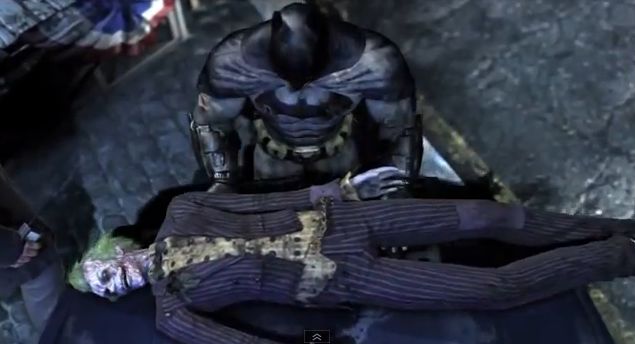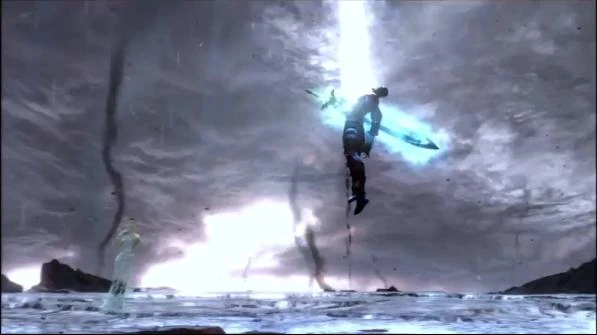Player One: The Unforgettable Hero
“Great, chainsaw,” I blurt as I quickly barricade the house I’m sandwiched in. I had to think fast. VROOM VROOM sounds amidst the various shouts of Spanish only escalated my overwhelming predicament and I knew it was only a matter of time before I’d end up the latest butchered victim in a Spanish Texas Chainsaw Massacre (or I guess in this case, La Matanza de Texas).
Suddenly, glass shatters upstairs.
“Shit.” And just when I didn’t think things could get any worse.
I had to get out of there. I quit dawdling, run up the stairs, and frantically grab the pump-action shotgun displayed on the wall. My moment of relief is short-lived however, as a villager climbs through the shattered window and chucks a pickaxe at me. I sustain some damage and return the favor, shooting the bastard in the head and kicking his sorry ass out the window. I hear some commotion coming from outside, so I scan the area, only to find a Leatherface wannabe climbing a ladder with a mere two steps shy of reaching me. At the same time, the barricades were being torn down and more villagers started pouring into the house.
This is it. My date with a potato sack-wearing, chainsaw-waving madman alongside Spanish-speaking, pitchfork-wielding xenophobes begins now. No allies, superpowers, or invincibility stars to help me. It’s do or die.
SCHUCK, SCHUCK.
Experiencing a narrative through movies, TV shows, or even books doesn’t nearly affect me the same way like narratives in video games do. Not only is the experience similar to other entertainment mediums, but games take it to the next level, immersing the player in a unique world filled with distinct characters, breathtaking environments, and a captivating story. As the protagonist, the player doesn’t just get to experience the narrative. They get to live it. They become a part of it, virtually etching their name into the story like it was their very own. That’s one of the most fascinating things about games, whether you, as the player, are conscious of it or not. In essence, players transcend from their roles as simple viewers to the Marios, Links, Jills, and Laras.
Single-player games, in particular, instil a more personal relationship for the player because there is only one sole protagonist. Their purpose changes as the fine line between viewer and subject diminishes. The player’s experience becomes (for the most part) interactive as they transform into the protagonist, freely performing their actions, sharing their thoughts, and making their decisions. It’s a truly genuine and intimate experience beyond words and, coupled with a well-written, gripping narrative, it leaves players with an overwhelming flux of emotions. That being said, I’ve compiled a list of some of my favorite single-player game narratives that pulled my heartstrings in one way or another. Enjoy!
WARNING: SPOILER ALERT!
Batman: Arkham City

With the recent release of Arkham Knight, players are once again invited to be the Batman as he takes on Scarecrow and his greatest foes in the culmination of the Arkham series. I probably would’ve added it to this list, but I am nowhere near finished with the main story and don’t even get me started on the DLC. In that regard, I turned to another installment of the series: Arkham City.
What Rocksteady has done with the Batman franchise is a feat in of itself. They managed to break free of the poor writing and finicky game mechanics that have hampered superhero games and they did it with gusto, combining crafting narrative and satisfying physical combat. Even with the deranged madman’s death and the player (as the Dark Knight) carrying his cold, lifeless body out of Arkham, Batman and the Joker embody the forces of Yin and Yang, that no matter how opposite their views, deep down, they complement each other. Each person wouldn’t be the same without the other’s influence and the ending makes that painstakingly clear.
The Legend of Zelda Franchise

I doubt any words I express could fully capture the beauty and magnificence that is The Legend of Zelda franchise. Although Ocarina of Time particularly captivated the hearts of gamers (myself included) with its well-crafted story and stellar gameplay, the franchise, as a whole, deserves a ridiculous amount of praise after almost 30 years (and 15+ official games) of introducing the land of Hyrule and its courageous hero, Link.
God of War Franchise

A narrative that allows the player to graphically execute Greek Gods is intriguing, to say the least, but it’s SCE Santa Monica Studio’s use of the classic revenge theme that distinguishes itself. Although the player portrays Kratos as a vindictive, take-no-prisoners sort of badass, the writers did an amazing job creating his character arc. His self-realization and forgiveness of his past sins humanized his character, which made the ending of the series all the more appropriate.
The Walking Dead: Season One

I’m a big fan of the The Walking Dead TV show as well as an avid reader of the comics, so naturally, I became interested in this game. What I didn’t expect was how well TellTale Games translated the hit comic book and TV show into a riveting story depicting the unlikely, yet dynamic relationship between a convict and a young girl. As Lee, the player highly empathizes with Clementine, often making decisions on the basis of what will benefit her in this post-apocalyptic, zombie-ridden hell hole. The player would do anything for Clementine and it’s with this claim that carries well beyond the gut-wrenching finale of this first season.
Red Dead Redemption

Rockstar’s spiritual successor to Red Dead Revolver fully symbolized the grittiness of the Wild West. Its focus on the themes of morality and the sins of one’s past play a huge role in the character development of protagonist, John Marston. Redemption employed a morality-based system in which the player has the freedom to perform good deeds (resulting in the gain of positive honor) or commit crimes (resulting in the gain of negative honor). Of course, the player can choose to perform an array of good deeds or commit crimes, further obscuring the line between good and evil and bringing out their inner antihero.
The final confrontation between Marston and the corrupt government officials epitomized the harsh, brutal truth of escaping one’s past. You can’t. No matter what, your past will always catch up to you. And as John Marston, the player realizes this and willingly sacrifices himself for the sake of his family, thus achieving redemption. This moment alone already cemented itself as one of the best in a game narrative, but the epilogue did it more justice and put the final nail in the coffin.
The Last of Us

A world without hope. An outbreak threatening to destroy all of humanity. These are some of the qualities that characterize Naughty Dog’s masterpiece of a narrative. As Joel, the player bears the task of smuggling a young girl named Ellie, who is believed to be humanity’s last hope for an antidote. Carrying the pain of his daughter’s death, Joel vows to do anything to ensure Ellie’s safety. And with that, Naughty Dog crafted a beautiful and mesmerizing story, utilizing survival horror to illustrate a frantic and depraved world on the brink of destruction.
The player’s realization of a possible cure through Ellie’s death escalates through a series of events that will not only leave them shocked, but question their own individual morality. Is it justifiable to jeopardize the fate of humanity on the basis of saving someone reminiscent of a loved one?
What are some of your favorite single-player games with an unforgettable hero? Post your comments below.



